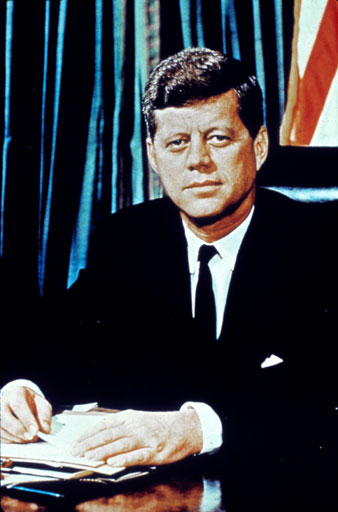 Everett CollectionPresident John F. Kennedy
Everett CollectionPresident John F. Kennedy
The author remembers his childhood friend Jack, who was about to leave a real mark on America when his life was cut short.
This has been a cruel year. In the space of six months we have lost Pope John and our own President. Together they stood for a new and better relationship in our country between Catholics and non-Catholics—for the great ecumenical hope that is hovering over us all.
This was the first of two changes that the advent of President Kennedy epitomized. His election meant that our choice was also no longer restricted by practice and unwholesome tradition to one particular category of American citizens. Now that a representative of the largest of our minorities had broken through the invisible barriers that had confined our choice of leaders, there was real reason why others from less accepted minorities should not follow him. In actuality now, rather than in civics-text platitude, the Presidency had been thrown open to everyone, regardless of religion or color—or even of sex.
The second great change was the coming to power of a new generation, the generation born during the First World War which had fought the Second War together. For them—for those of my own age—the President had suddenly and rather surprisingly become their contemporary. He was no longer a father; he was one of us, whether friend or rival. For myself, I had played football with him as a boy, and although life had completely separated us in subsequent years, I could never think of him except as Jack, long before the newspapers had made the nickname a national cliché. Even in death I find it impossible to speak of him with the usual solemn formality, and I think he would have preferred it that way. He was a most unstuffy man.
I will not here give a eulogy or recount a life. You know it all—the papers have been full of it. Nor would it be quite proper for me to do so; life cast me too often in opposition to him. Those of us who in the past years were committed to the scramble of American politics were too close up against the President to see fully who he was. Now that he is gone—now that we compare him to others—we suddenly see a void and feel our loss. It is as though we could appreciate his full stature only after his death. So we should search our consciences. Were we always fair, in judging him?— or, beyond that, were we always charitable?
Like so many, I was in a public place when the new began to come in. People did not know what to do—whether to go about their ordinary pursuits or to give themselves wholly to their grief. These first moments were the most impressive part of the first forty-eight hours—the disarray, the broken phthses, the inability to say what one felt—before the TV sets began to grind and the official mourning took over.
Popular
"swipe left below to view more authors"Swipe →
I heard just one expression of anger. A Negro came by shaking his head and muttering in bitter irony; “Only in America.”
His anger reflected what most of us at first thought: that the crime had been committed by a Southern racist. Indeed, if we look deeply into our souls, I think many of us will recognize that we were disappointed to learn that such was not the case. As I have tried to meditate on these matters, I have finally come to the conclusion that it is better this way. Had the assassin been a Southern extremist, it would have fitted our own prejudices and our own political commitment. Our grief would have been tinged with a spirit of hatred and revenge. This way, our sorrow is pure: there is no hate in our hearts.
Does this mean that what the President experienced was no more than an ambiguous martyrdom—that he died a senseless death? I do not think so. Nothing can take away the memory of courage and good humor with which he went into the South—where he knew so many people hated him—nor the sense of strength and mastery that he conveyed at the end. His death stands as a dreadful warning against the violence lying just under the surface of our bland and agreeable national character. Again and again in the past months it had broken out in mad killings. We have tried to forget them, we have tried to push it under the rug and to think of other things. Now it has struck our President; we can no longer pretend it isn’t there. Now we know that we can permit such things to happen no longer—that the blind killing must stop.
As with Pope John, Jack Kennedy’s last months were his best. As in the case of the Pope, he seems to have had a sense that there was not much time left. It was now or never if he was to leave his mark on history. Jack Kennedy had been a hard-driving boy; as a man he gave the impression of not being able to wait; of feeling that his every minute was counted. So it was just at the end that he made his start in the two great directions that emerged from the struggles of last summer and autumn—toward peace with the test ban, toward human equality with the civil-rights bill. Both were aimed against violence and hatred. They are his legacy to us.
Jack Kennedy died at the top of his form. There was no loss of capacity, no diminuendo, no anticlimax. I think that was the way he would have preferred to die. We saw him at the last at his very best, bearing witness against the multiple evils that beset our world, his death a symbol of our hope to still the violence and hatred in our hearts.


